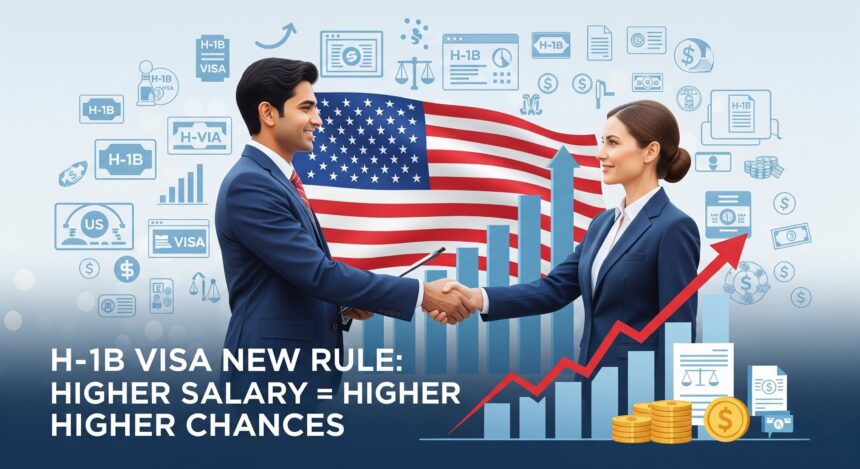H-1B Visa New Rule Aims to Prioritize High-Skilled, High-Wage Foreign Workers
The H-1B visa new rule proposed by the U.S. Department of Homeland Security (DHS) and U.S. Citizenship and Immigration Services (USCIS) could significantly reshape how foreign professionals are selected for employment in the U.S. The new regulatory proposal—titled Weighted Selection Process for Registrants and Petitioners Seeking To File Cap-Subject H-1B Petitions—seeks to reward higher wages and specialized skills in the H-1B selection process.
Currently, the H-1B program uses a beneficiary-centric system. The traditional lottery-based approach was phased out, and now, the H-1B visa new rule may bring a merit- and wage-based method that could greatly benefit high-earning foreign professionals.
What Is the H-1B Visa New Rule?
While full details of the H-1B visa new rule are yet to be made public, early insights suggest that applicants offering higher wage levels will be given priority in the selection process. The DHS plans to implement a system where U.S. employers offering higher salaries have a greater chance of securing H-1B approvals for their foreign employees.
This change echoes a similar rule proposed back in 2021, which emphasized ranking H-1B applications based on prevailing wage levels set by Occupational Employment Statistics (OES). Under this model, candidates earning at OES wage level IV would be prioritized over those at lower levels, down to wage level I.
Why the H-1B Visa New Rule Matters
According to U.S. authorities, prioritizing wage levels through the H-1B visa new rule could accomplish several goals:
- Encourage U.S. employers to offer competitive salaries
- Attract highly skilled and educated foreign workers
- Discourage misuse of the H-1B program to fill low-wage, low-skill positions
- Align with the program’s original intention—to fill U.S. labor shortages in specialty occupations
This move comes as 85,000 H-1B visas are issued annually, including 20,000 reserved for those with U.S. advanced degrees. Due to overwhelming demand, the H-1B visa new rule seeks to ensure that only the most qualified and well-compensated professionals are selected.
LImplications of the New H-1B Wage-Based Selection Process
The H-1B visa new rule could reshape both U.S. immigration and labor markets. For U.S. companies, this might mean increased payroll costs, as foreign talent may command higher salaries to be eligible. On the flip side, for foreign workers, the rule presents a golden opportunity to earn more and secure positions in top U.S. firms.
However, critics warn that some employers may cut back on H-1B hiring due to rising costs. Immigration attorneys are urging companies to evaluate their budget flexibility, as the H-1B visa new rule could raise the financial threshold for participation in the program.
Long-Term Impact on U.S. Workforce and Immigration
The H-1B visa new rule also attempts to address growing concerns among American citizens who feel that foreign workers are taking over their jobs. By prioritizing higher-paid professionals, the government aims to restore public confidence while still fulfilling the need for top international talent.
This rule aligns with the administration’s broader immigration goals: to ensure that H-1B visas are granted to individuals who truly meet the definition of specialty occupation—those with advanced skills and degrees.
A Boost for Foreign Workers Seeking H-1B Visas
For foreign professionals, especially those in IT, finance, engineering, and healthcare, the H-1B visa new rule represents a chance to leverage their experience and demand higher salaries. The policy shift could significantly improve the average wage levels of H-1B workers, contributing to a more balanced and fair immigration system.
While challenges may arise, the core intention behind the H-1B visa new rule is to elevate the program’s quality, eliminate exploitation, and create opportunities for deserving, high-performing global talent.
Also Read: Trump Administration Plans Changes to Skilled Worker Visas and Citizenship Test USA 2025






